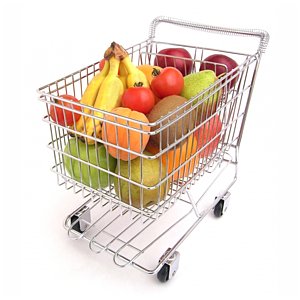
Well, my last post about organic vs non-organic certainly got a reaction.
I have a deluge of emails into my inbox ranging from comments like "About time someone was talking about this!" to "This is utter nonsense. If pesticides were harmful then they wouldn't be allowed to be used on foods. You shouldn't be scaremongering!!" and practically everything in between.
Regardless of which 'camp' you were in, thanks for taking the time to write me with your thoughts on this subject (though I do wish you'd have written them here on the blog so more people could benefit from your comments) : )
By far the most common reaction though, was more like this:
"I understand and mostly agree with the need to eat cleaner, fresher and less adulterated foods but the truth is, they're more expensive and I just can't afford them as much as I'd like. What am I supposed to do?"
Again, another great question, and one that I'm sure most people ask themselves when it comes to making the decision between non-organic and organic produce, right?
Here's my take on it.
Non organic is cheaper, it's true. The average family and especially those on low incomes can buy around 30-50% more food when bought non-organically than they can if they choose the organic option and so it would seem that whilst organic is an ideal scenario, the practicalities mean that most people simply can't justify coming home with a smaller bag of groceries with hungry mouths to feed.
I get it.
I'm a father of four and before my business took off, I was on a low income and felt the same way. I couldn't justify organic foods because of the costs.
Then, over time I started to see things differently.
I noticed that my non-organic shopping, whilst greater in quantity, always seemed to leave my family hungry. They always wanted more. Bigger servings, more snacks in between and practically non-stop cravings for more food.
By contrast, when my family ate organic, they ate smaller portions, less frequently and they rarely, if ever, complained of hunger or asked for more.
It was then that it hit me, truly for the first time ever.
The most important nutritional truth.
Ready for it?
It'll change your life (if you let it!)
Here it is.
Your body doesn't know 'food', all it knows is nutrients.
Bear with me because I know that it probably doesn't sound that amazing as you read it at your PC but it really is.
You see, we get hung up on food all the time. We get hung up on calories, portion sizes, meal frequencies and all manner of things but none of that is anywhere near as important as the nutrients within the things we eat.
Your body just knows that it is running out of certain nutrients.
"Vitamin B6 is getting low" it says and so you get a 'feed me' signal to eat and (hopefully) stock up on the missing vitamin.
"Calcium is running out" it says and again, you get a 'feed me' signal to eat and stock up on some calcium.
It's that straight forward, that simple... and that complex : )
So, when you eat denatured and nutrient poor foods, either because they've been chemically altered or over-processed, your body breaks them down, looks for the nutrients it needs and, if they're not there (which they won't be), simply commands you to eat again so that it can get what it needs.
It's got nothing to do with calories.
You might have already eaten your recommended daily amount of calories but still be lacking nutrients and so you'll be commanded to eat again, and again, and again.
This is not hunger. This is malnutrition.
The truth is hard to believe, but the fact is, many of us are malnourished!
But it's not all bad news, because the reverse is also true.
If you eat a diet that is replete with the nutrients your body requires then you eat less. You eat when your body needs a new supply of nutrients. You stop snacking, you stop feeling hungry all the time and you stop throwing excess calories into your body for no reason.
This is why the elimination diet works so well. It focuses on allowing your body to extract the maximum nutrition from your foods so that you get hungry less often and so lose fat faster whilst at the same time maintaining lean muscle.
What's this got to do with where the conversation started; the cost of organic vs non-organic?
It's pretty simple really.
When you eat non-processed (including chemical processes) foods, you're getting the maximum available nutrition from everything you eat. Because of this, you simply eat less and less often.
What I'm saying here is that you don't have to buy nearly as much organic food as you do non-organic to get your nutritients so it's not more expensive to eat this way at all.
In fact, you may even find, like my family did, that it's cheaper to eat organically than non-organically because you buy much less of the usual rubbish that most families consume on a weekly basis.
Still not sure if you agree with me?
Try it for 1 week.
Try feeding yurself and your family from organic sources for just 1 week and see if you can notice the difference for yourself. If not, then hey, just ignore me, what do I know, right? : )
Dax Moy
The UK's Leading Personal Trainer
http://www.mylondonpersonaltrainer.com
P.S - I'd love to hear your comments on this post. Whatever they may be : )
P.P.S - For your very own FREE Copy of my Elimination Diet visit http://www.mylondonpersonaltrainer.com/Free-Elimination-Diet.htm






